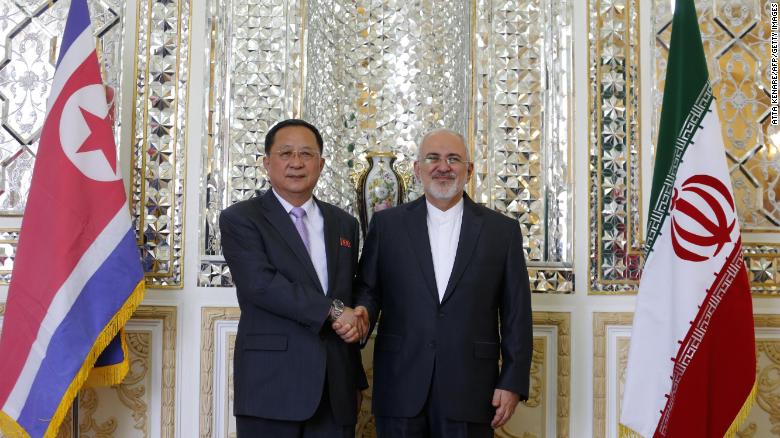Iran-North Korea: stronger relations
August 8, 2018 | Expert Insights

Iranian Foreign Minister Mohammad Javad Zarif welcomed his North Korean counterpart, Ri Yong Ho, to Tehran on Tuesday. The meeting took place hours after the United States reintroduced sanctions against the Islamic Republic.
Background
Diplomatic relations between Iran and North Korea picked up following the Iranian Revolution in 1979. The United States has been greatly concerned by North Korea's arms deals with Iran. This started during the 1980s with North Korea acting as a third party in arms deals between the Communist bloc and Iran. They are also the remaining two members of George W. Bush's "Axis of evil", which has led to many of the concerns regarding Iran–North Korea relations. Despite the two countries' shared antagonism to U.S. foreign policies, the specific national interests of the DPRK and the Islamic Republic of Iran were often considerably different from each other.
The Joint Comprehensive Plan of Action (JCPOA) is a comprehensive agreement between the P5+1 countries, EU and Iran to prevent nuclear arms development in Iran in exchange for the removal of sanctions. Recently, President Trump, a long-time critic of the Iran nuclear deal pulled out of the pact in May 2018. Washington also imposed a series of additional sanctions on Iranian entities, individuals and foreign companies.
The historic Singapore Summit held on 12th June, saw President Trump and Mr Kim agreeing to begin a diplomatic process to “work toward complete denuclearization of the Korean Peninsula.”However, recent developments show that North Korea has not been following up on its promise. A UN report found that North Korea has not halted its nuclear missile programme and is trying to sell weapons to the Middle East and Africa.

Analysis
Iranian Foreign Minister Javad Zarif and North Korean counterpart Ri Yong Ho called for expanded relations during their recent meeting in Tehran. Iran’s state-run news agency reported on the meeting, but provided few details about the talks, other than to say the pair “discussed the latest regional and international developments, as well as issues of mutual interest.”It was the first visit by a senior North Korean official to Iran during the second term of Iranian President Hassan Rouhani and was made upon a request by the North Korean foreign minister.
Both North Korea and Iran have had a tumultuous relationship with the US. The meeting underscores the challenges facing Trump administration efforts to pressure the nations to curb their weapons programs and give up their nuclear aspirations. It came on the same day that countries from Russia to the U.K. criticized the restoration of U.S. sanctions against Iran and Trump’s national security adviser, John Bolton, accused North Korea of moving too slowly on its “denuclearization” promises to the president.
A UN panel of experts has expressed concern over military collaboration between Iran and North Korea in the past. In a 2017 report, it noted the presence of designated North Korean weapons traffickers living in Tehran and the similarity between missile designs in the two countries. According to Pyongyang's official KCNA news agency, Mr Ri was present alongside a high-level Iranian delegation at a meeting of the Non-Aligned Movement in Baku, Azerbaijan in April.
Washington's so-called "snapback" sanctions were reinstated against Tehran at 12:01 a.m. EDT on Aug 7, a US Treasury official said, speaking on condition anonymity. While most of the world has been focusing on the sanctions on Iran's vast oil and gas reserves that will be reimposed in November, this first wave of sanctions will hit Iran's vulnerable economy harder than most are currently anticipating.
Trump’s decision to pull out of the 2015 nuclear deal did not just affect Iran’s economy but also set a shaky foundation for relations with DPRK. Thus, reports on North Korea backtracking and not honoring the Singapore summit pledge seem plausible - as it stems from distrust of Trump’s disruptive policies.
Counterpoint
Experts say that, far from ties being “special,” there is a surprising lack of depth and history in the North Korean-Iranian relationship. They believe that the betterment of Iran-DPRK relations might not last as they could soon go back to further their own national interests.
Assessment
Our assessment is that the meeting between Iran and North Korea comes at a time when both the countries are under mounting pressure from the US. We feel that the timing of the meeting is not merely a coincidence. While Iran’s economy faces the brunt of US sanctions and North Korea backtracks on its denuclearization pledge, we believe that the outcome of this meeting will be closely watched by Washington.








Comments